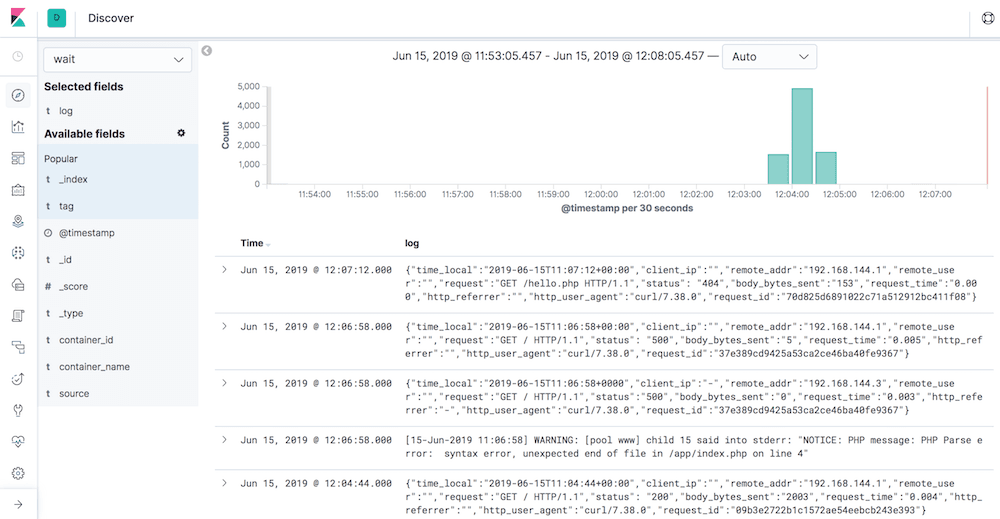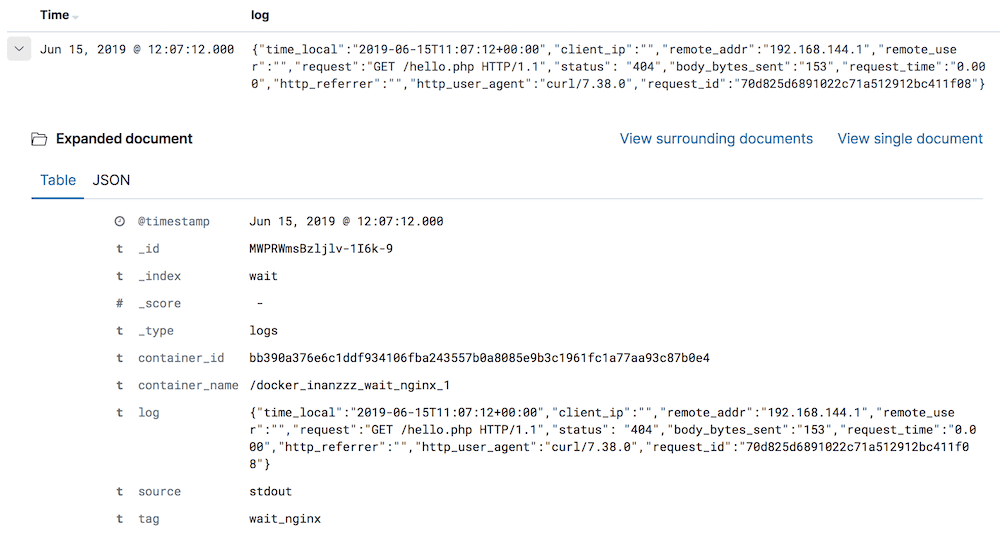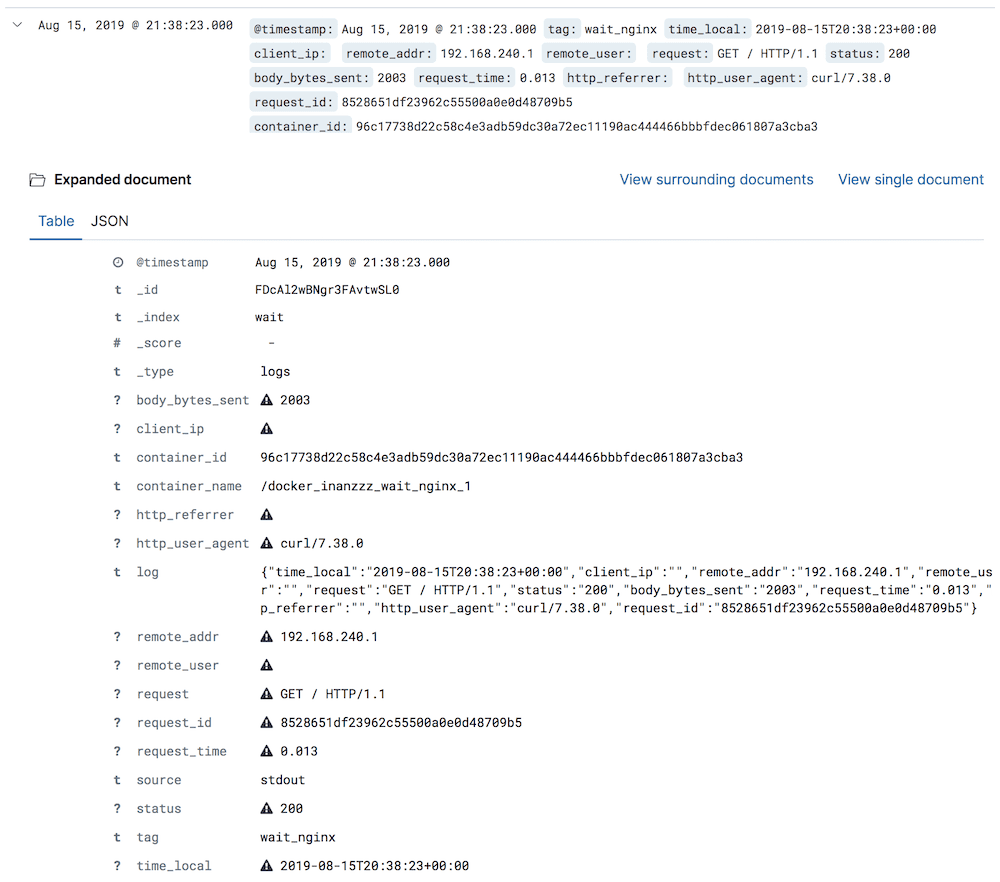Using Fluent-Bit to forward Docker PHP-FPM and Nginx logs to Elasticsearch
15/06/2019 - DOCKER, ELASTICSEARCH, NGINX
In this example we are going to forward our PHP-FPM and Nginx logs to Elasticsearch. In order to do that we will be using Fluent-Bit. Our monitoring stack is EFK (Elasticsearch Fluent-Bit Kibana). The reason we are not using FileBeat and Logstash is because Fluent-Bit is very very light weight on system resources. We are talking about barely a few KB/MB compared to hundreds of MBs!!! It has build-in persistence mechanism as well such as memory and filesystem. FileBeat and Logstash solution will require something like Redis for persistence.
Flow
PHP-FPM and Nginx logs are being watched by Fluent-Bit then get forwarded to Elasticsearch. As simple as that!
Application setup
Structure
.
├── docker
│ ├── docker-compose.yml
│ ├── nginx
│ │ ├── app.conf
│ │ ├── Dockerfile
│ │ └── nginx.conf
│ └── php
│ ├── Dockerfile
│ ├── php.ini
│ └── www.conf
└── index.php
docker/docker-compose.yml
Fluentd logging driver options can be find here and here.
version: "3.4"
services:
inanzzz_wait_php:
build:
context: "./php"
hostname: "wait-php"
volumes:
- "..:/app"
environment:
PS1: "\\u@\\h:\\w\\$$ "
logging:
driver: "fluentd"
options:
fluentd-address: "inanzzz_monitoring_fluent_bit"
tag: "wait_php"
mode: "non-blocking"
max-buffer-size: "2m"
fluentd-async-connect: "true"
inanzzz_wait_nginx:
build:
context: "./nginx"
hostname: "wait-nginx"
ports:
- "1080:80"
volumes:
- "..:/app"
depends_on:
- "inanzzz_wait_php"
environment:
PS1: "\\u@\\h:\\w\\$$ "
logging:
driver: "fluentd"
options:
fluentd-address: "inanzzz_monitoring_fluent_bit"
tag: "wait_nginx"
mode: "non-blocking"
max-buffer-size: "2m"
fluentd-async-connect: "true"
docker/nginx/app.conf
server {
listen 80 default_server;
server_name localhost;
root /app;
index index.php;
location ~ \.php$ {
try_files $uri =404;
fastcgi_pass inanzzz_wait_php:9000;
fastcgi_split_path_info ^(.+\.php)(/.+)$;
fastcgi_index index.php;
include fastcgi_params;
fastcgi_param SCRIPT_FILENAME $document_root$fastcgi_script_name;
fastcgi_param PATH_INFO $fastcgi_path_info;
fastcgi_param HTTP_X_REQUEST_ID $request_id;
}
}
docker/nginx/Dockerfile
FROM nginx:1.15.8-alpine
WORKDIR /app
COPY app.conf /etc/nginx/conf.d/default.conf
COPY nginx.conf /etc/nginx/nginx.conf
docker/nginx/nginx.conf
user nginx;
worker_processes 1;
error_log /var/log/nginx/error.log warn;
pid /var/run/nginx.pid;
events {
worker_connections 1024;
}
http {
include /etc/nginx/mime.types;
default_type application/octet-stream;
log_format json_combined escape=json
'{'
'"time_local":"$time_iso8601",'
'"client_ip":"$http_x_forwarded_for",'
'"remote_addr":"$remote_addr",'
'"remote_user":"$remote_user",'
'"request":"$request",'
'"status":"$status",'
'"body_bytes_sent":"$body_bytes_sent",'
'"request_time":"$request_time",'
'"http_referrer":"$http_referer",'
'"http_user_agent":"$http_user_agent",'
'"request_id":"$request_id"'
'}';
access_log /var/log/nginx/access.log json_combined;
error_log off;
sendfile on;
keepalive_timeout 65;
include /etc/nginx/conf.d/*.conf;
}
docker/php/Dockerfile
FROM php:7.2.13-fpm-alpine3.8
WORKDIR /app
COPY php.ini /usr/local/etc/php/conf.d/php.override.ini
COPY www.conf /usr/local/etc/php-fpm.d/www.conf
CMD ["php-fpm", "--nodaemonize"]
docker/php/php.ini
[PHP]
date.timezone=UTC
log_errors=On
error_reporting=E_ALL & ~E_DEPRECATED & ~E_STRICT
display_errors=Off
max_execution_time=60
memory_limit=256M
docker/php/www.conf
[global]
daemonize=no
[www]
user=www-data
group=www-data
listen=inanzzz_wait_nginx:9000
pm=dynamic
pm.max_children=40
pm.start_servers=2
pm.min_spare_servers=2
pm.max_spare_servers=4
pm.max_requests=500
access.format='{"time_local":"%{%Y-%m-%dT%H:%M:%S%z}T","client_ip":"%{HTTP_X_FORWARDED_FOR}e","remote_addr":"%R","remote_user":"%u","request":"%m %{REQUEST_URI}e %{SERVER_PROTOCOL}e","status":"%s","body_bytes_sent":"%l","request_time":"%d","http_referrer":"%{HTTP_REFERER}e","http_user_agent":"%{HTTP_USER_AGENT}e","request_id":"%{HTTP_X_REQUEST_ID}e"}'
Monitoring setup
Structure
├── data
├── docker-compose.yml
└── fluent-bit.conf
docker-compose.yml
version: "3.4"
services:
inanzzz_monitoring_elasticsearch:
image: "docker.elastic.co/elasticsearch/elasticsearch:7.1.1"
hostname: "monitoring-elasticsearch"
environment:
node.name: "monitoring_node"
discovery.type: "single-node"
cluster.name: "monitoring_cluster"
bootstrap.memory_lock: "true"
ES_JAVA_OPTS: "-Xms512m -Xmx512m"
PS1: "\\u@\\h:\\w\\$$ "
ulimits:
memlock:
soft: "-1"
hard: "-1"
ports:
- "9200:9200"
volumes:
- "./data/elasticsearch:/usr/share/elasticsearch/data"
inanzzz_monitoring_fluent_bit:
image: "fluent/fluent-bit:1.0.4"
hostname: "monitoring-fluent-bit"
ports:
- "24224:24224"
depends_on:
- "inanzzz_monitoring_elasticsearch"
volumes:
- "./fluent-bit.conf:/fluent-bit/etc/fluent-bit.conf:ro"
inanzzz_monitoring_kibana:
image: "docker.elastic.co/kibana/kibana:7.1.1"
hostname: "monitoring-kibana"
environment:
ELASTICSEARCH_HOSTS: "http://inanzzz_monitoring_elasticsearch:9200"
ports:
- "5601:5601"
depends_on:
- "inanzzz_monitoring_elasticsearch"
inanzzz_monitoring_elastichq:
image: "elastichq/elasticsearch-hq"
hostname: "monitoring-elastichq"
ports:
- "5000:5000"
depends_on:
- "inanzzz_monitoring_elasticsearch"
fluent-bit.conf
If the incoming log flow is not too intense you can get remove all storage.* keys. The persistence will fallback to memory which is default.
[SERVICE]
Flush 5
Daemon Off
Log_Level debug
storage.path /var/log/flb-storage
storage.sync normal
storage.checksum off
storage.backlog.mem_limit 5M
[INPUT]
Name forward
storage.type filesystem
Listen inanzzz_monitoring_fluent_bit
Port 24224
[OUTPUT]
Name es
Host inanzzz_monitoring_elasticsearch
Port 9200
Match wait_*
Index wait
Type logs
Include_Tag_Key On
Tag_Key tag
You can use $ curl -X GET 0.0.0.0:9200/_cat/indices to list all indexes and $ curl -X GET 0.0.0.0:9200/wait/_search to see the content of wait index. Also Kibana is accessible via http://localhost:5601 and ElasticHQ via http://192.168.99.30:5000.
Tests
Send some requests to your application. The result should look similar to one below.


Splitting logs
Use example below to split log string into individual log fields so that searching, reporting and visualising becomes easier. This is the preferred config you should use.
fluent-bit.conf
[SERVICE]
Flush 5
Daemon Off
Log_Level debug
storage.path /var/log/flb-storage
storage.sync normal
storage.checksum off
storage.backlog.mem_limit 5M
Parsers_File parsers.conf
[INPUT]
Name forward
storage.type filesystem
Listen inanzzz_monitoring_fluent_bit
Port 24224
[FILTER]
Name parser
Parser docker
Match wait_*
Key_Name log
Reserve_Data On
Preserve_Key On
[OUTPUT]
Name es
Host inanzzz_monitoring_elasticsearch
Port 9200
Match wait_*
Index wait
Type logs
Include_Tag_Key On
Tag_Key tag
parsers.conf
# When this is used, empty fields are removed from the log so we are missing value.
[PARSER]
Name json_regex
Format regex
Regex ^{"time_local":"(?<time_local>.*?)","client_ip":"(?<client_ip>.*?)","remote_addr":"(?<remote_addr>.*?)","remote_user":"(?<remote_user>.*?)","request":"(?<request>.*?)","status":"(?<status>.*?)","body_bytes_sent":"(?<body_bytes_sent>.*?)","request_time":"(?<request_time>.*?)","http_referrer":"(?<http_referrer>.*?)","http_user_agent":"(?<http_user_agent>.*?)","request_id":"(?<request_id>.*?)"}$
# This doesn't have the problem mentioned above so this is the preferred choice.
[PARSER]
Name docker
Format json
Time_Key time
Time_Format %Y-%m-%dT%H:%M:%S.%L
Time_Keep On
# Command | Decoder | Field | Optional Action
# =============|==================|=================
Decode_Field_As escaped_utf8 log do_next
Decode_Field_As json log
Outcome
